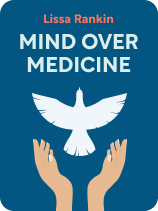

This article is an excerpt from the Shortform book guide to "Mind Over Medicine" by Lissa Rankin. Shortform has the world's best summaries and analyses of books you should be reading.
Like this article? Sign up for a free trial here.
How does stress affect your health? What happens in your body when you’re stressed?
In the modern world, most stress isn’t related to a real threat or danger. Rather, it is self-inflicted through negative thinking and worrying. However, it can still have a destructive effect on your health.
Here’s how stress affects your health, according to physician Lissa Rankin.
How Stress Affects Your Nervous System
Rankin says that stress is the most powerful mechanism behind the mind’s influence on physical health. Negative beliefs that perpetuate stressful feelings (such as fear, frustration, or loneliness) can trigger your fight-or-flight response, which releases a flood of energizing hormones to help you survive—two of which are adrenaline and norepinephrine. Although this stress response can empower us to fight or flee our way to safety in a life-threatening situation, Rankin says it can be destructive to our health when chronic:
- Frequent surges in blood pressure eventually damage your vessel walls, risking tears.
- The constant production of fatty acids and glucose for emergency energy causes a build-up of plaque which increases your risk of heart attacks.
- Overproduction of cortisol suppresses the immune system, making you more vulnerable to disease.
- Constant muscle activation and strain can lead to stiffness and structural problems. This is because when you trigger continuous stress responses, you never give your body a chance to relax and repair.
On the other hand, Rankin says when you proliferate positive beliefs, you induce relaxation rather than panic, which allows your body to focus its energy on maintenance and healing. This is because relaxation activates your parasympathetic nervous system (otherwise known as the “rest and repair” response), which counters your fight-or-flight response by helping your body return to resting, healing processes. For example, the relaxation response allows you to invest energy in digestion, reproduction, and repairing damaged cells. When you relax, your immune system also starts running on all cylinders again, which helps you fight and prevent disease more effectively.
| Is Stress All Bad? In The Upside of Stress, Kelly McGonigal explains that your stress response is more nuanced than just “fight or flight,” and it can even help you heal. She explains how stress affects your health depending on what kind of stress you’re experiencing: Fight-or-flight. When you perceive that your life is in danger, this response energizes you for action and helps your body anticipate potential injury by shrinking your blood vessels (to minimize blood loss) and increasing inflammation. McGonigal and Rankin seem to agree that this response can be beneficial in short-term, life-threatening circumstances, but is harmful when chronic. Challenge response. This response activates when you feel called to perform, but you don’t perceive that your life is at risk. So, instead of feeling afraid, you feel confident. Similar to fight-or-flight mode, the challenge response energizes your body for action, but because you don’t perceive a threat, you don’t constrict your blood vessels or increase inflammation (McGonigal says these symptoms are responsible for the negative health effects associated with fight-or-flight.) So, the challenge response empowers you to perform without harming your health. In fact, the challenge response even enhances your health by releasing DHEA, a hormone that bolsters your immune system and helps you learn from stressful events more effectively. Tend-and-befriend. When you perceive that a person you care about needs your help or you feel in need of support, you activate the tend-and-befriend stress response. This response releases oxytocin, which helps you feel more courageous and connect with people to give or receive emotional support. Oxytocin also helps you endure pain more effectively and it protects your heart from the damaging effects of extreme fight-or-flight stress. To induce the beneficial forms of stress, shift your mindset in a couple key ways: Focus on your resources. McGonigal explains that the biggest determinant of whether you have a fight-or-flight response or challenge response is whether or not you believe you have the ability to handle the stressful situation at hand. Increase your confidence by focusing on your personal strengths and thinking of the people in your life that can offer you support.Connect with others. To induce more tend-and-befriend responses, cultivate close connections with others by performing small acts of service for people you love or your community and focusing on common goals that you share with others. |

———End of Preview———
Like what you just read? Read the rest of the world's best book summary and analysis of Lissa Rankin's "Mind Over Medicine" at Shortform.
Here's what you'll find in our full Mind Over Medicine summary:
- How a healthy mind can heal physical ailments
- How our beliefs, our relationships, and our jobs affect our health
- How to improve the most important parts of your life






